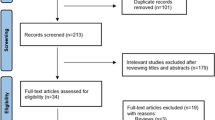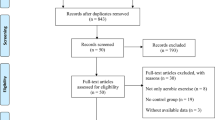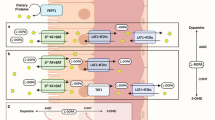Abstract
Background
Diet significantly impacts Parkinson’s disease (PD) with plausible biological hypotheses. Although the thesis has been explored in several human clinical trials, no current meta-analyses or reviews summarize the results. We examined the effect of intervention of dietary supplements, foods, and dietary patterns in treating PD.
Methods
We conducted a meta-analysis and systematic review of randomized and crossover studies published between 1989 and 26 June 2022, searching from PubMed, Embase, Medline, Scopus, Cochrane Library databases, and Chinese databases. Twenty-four studies were included in this review.
Results
The meta-analysis results show that dietary supplements intervention significantly increased the quantitative insulin sensitivity check index (QUICKI) [MD = 0.02, 95% CI (0.01, 0.02), p < 0.00001]. Dietary supplement intervention does not significantly affect the total Unified Parkinson Disease Rating Scale (UPDRS) score and six-min walk test (6MWT) distance. We did not find evidence that dietary supplements or food intervention may minimize the UPDRS III score. However, systematic review results indicated that the Mediterranean, low-fat, and ketogenic diets significantly reduced the total UPDRS score; low-protein diets meaningfully mitigated motor symptoms.
Conclusions
This meta-analysis result displays that diet and diet supplements had a very modest but statistically significant impact on QUICKI but no effect on motor and non-motor symptoms in PD. The systematic review concludes that dietary patterns intervention may positively attenuate the overall symptoms of PD, including both motor and non-motor symptoms.
This is a preview of subscription content, access via your institution
Access options
Subscribe to this journal
Receive 12 print issues and online access
$259.00 per year
only $21.58 per issue
Buy this article
- Purchase on Springer Link
- Instant access to full article PDF
Prices may be subject to local taxes which are calculated during checkout








Similar content being viewed by others
Data availability
All data during the study appear in the submitted article.
References
Lees AJ, Hardy J, Revesz T. Parkinson’s disease. Lancet. 2009;373:2055–66. https://doi.org/10.1016/S0140-6736(09)60492-X.
Kalia LV, Lang AE. Parkinson’s disease. Lancet. 2015;386:896–12. https://doi.org/10.1016/S0140-6736(14)61393-3.
Marras C, Canning CG, Goldman SM. Environment, lifestyle, and Parkinson’s disease: implications for prevention in the next decade. Mov Disord. 2019;34:801–11. https://doi.org/10.1002/mds.27720.
Agnihotri A, Aruoma OI. Alzheimer’s disease and Parkinson’s disease: a nutritional toxicology perspective of the impact of oxidative stress, mitochondrial dysfunction, nutrigenomics and environmental chemicals. J Am Coll Nutr. 2020;39:16–27. https://doi.org/10.1080/07315724.2019.1683379.
Seidl SE, Santiago JA, Bilyk H, Potashkin JA. The emerging role of nutrition in Parkinson’s disease. Front Aging Neurosci. 2014;6:36. https://doi.org/10.3389/fnagi.2014.00036.
Perez-Pardo P, Kliest T, Dodiya HB, Broersen LM, Garssen J, Keshavarzian A, et al. The gut-brain axis in Parkinson’s disease: possibilities for food-based therapies. Eur J Pharm. 2017;817:86–95. https://doi.org/10.1016/j.ejphar.2017.05.042.
Strikwerda AJ, Dommershuijsen LJ, Ikram MK, Voortman T. Diet quality and risk of Parkinson’s disease: the Rotterdam Study. Nutrients. 2021;13:3970. https://doi.org/10.3390/nu13113970.
Alfonsetti M, Castelli V, d’Angelo M. Are we what we eat? Impact of diet on the gut-brain axis in Parkinson’s disease. Nutrients. 2022;14:380. https://doi.org/10.3390/nu14020380
Castelli V, Benedetti E, Antonosante A, Catanesi M, Pitari G, Ippoliti R, et al. Neuronal cells rearrangement during aging and neurodegenerative disease: metabolism, oxidative stress and organelles dynamic. Front Mol Neurosci. 2019;12:132. https://doi.org/10.3389/fnmol.2019.00132.
Barichella M, Cereda E, Cassani E, Pinelli G, Iorio L, Ferri V, et al. Dietary habits and neurological features of Parkinson’s disease patients: implications for practice. Clin Nutr. 2017;36:1054–61. https://doi.org/10.1016/j.clnu.2016.06.020.
Liddle RA. Parkinson’s disease from the gut. Brain Res. 2018;1693:201–6. https://doi.org/10.1016/j.brainres.2018.01.010.
Castelli V, Grassi D, Bocale R, d’Angelo M, Antonosante A, Cimini A, et al. Diet and brain health: which role for polyphenols? Curr Pharm Des. 2018;24:227–38. https://doi.org/10.2174/1381612824666171213100449.
Talebi S, Ghoreishy SM, Jayedi A, Travica N, Mohammadi H. Dietary antioxidants and risk of Parkinson’s disease: a systematic review and dose-response meta-analysis of observational studies. Adv Nutr. 2022;13:1493–504. https://doi.org/10.1093/advances/nmac001.
Higgins JP, Altman DG, Gøtzsche PC, Jüni P, Moher D, Oxman AD, et al. The Cochrane Collaboration’s tool for assessing risk of bias in randomised trials. BMJ. 2011;343:d5928. https://doi.org/10.1136/bmj.d5928.
Balshem H, Helfand M, Schünemann HJ, Oxman AD, Kunz R, Brozek J, et al. GRADE guidelines: 3. Rating the quality of evidence. J Clin Epidemiol. 2011;64:401–6. https://doi.org/10.1016/j.jclinepi.2010.07.015.
Zhou H, Ye M, Xu W, Yu M, Liu X, Chen Y. DL-3-n-butylphthalide therapy for Parkinson’s disease: a randomized controlled trial. Exp Ther Med. 2019;17:3800–6. https://doi.org/10.3892/etm.2019.7397.
Storch A, Jost WH, Vieregge P, Spiegel J, Greulich W, Durner J, et al. Randomized, double-blind, placebo-controlled trial on symptomatic effects of coenzyme Q(10) in Parkinson disease. Arch Neurol. 2007;64:938–44. https://doi.org/10.1001/archneur.64.7.nct60005.
Barichella M, Cereda E, Pinelli G, Iorio L, Caroli D, Masiero I, et al. Muscle-targeted nutritional support for rehabilitation in patients with Parkinsonian syndrome. Neurology. 2019;93:e485–96. https://doi.org/10.1212/WNL.0000000000007858.
Baroni L, Bonetto C, Tessan F, Goldin D, Cenci L, Magnanini P, et al. Pilot dietary study with normoproteic protein-redistributed plant-food diet and motor performance in patients with Parkinson’s disease. Nutr Neurosci. 2011;14:1–9. https://doi.org/10.1179/174313211X12966635733231.
Anamnart C, Kitjarak R. Effects of vitamin B12, folate, and entacapone on homocysteine levels in levodopa-treated Parkinson’s disease patients: a randomized controlled study. J Clin Neurosci. 2021;88:226–31. https://doi.org/10.1016/j.jocn.2021.03.047.
Cereda E, Pinelli G, Iorio L, Caroli D, Masiero I, Ferri V, et al. Protein, leucine and vitamin D enhancing rehabilitation (pro-leader) in patients with Parkinson’s disease or parkinsonism: a randomized clinical trial. Clin Nutr. 2018;37:S25. https://doi.org/10.1016/j.clnu.2018.06.2101.
Clemens P, Baron JA, Coffey D, Reeves A. The short-term effect of nicotine chewing gum in patients with Parkinson’s disease. Psychopharmacology. 1995;117:253–6. https://doi.org/10.1007/BF02245195.
Coe S, Andreoli D, George M, Collett J, Reed A, Cossington J, et al. A feasibility study to determine whether the daily consumption of flavonoid-rich pure cocoa has the potential to reduce fatigue and fatigability in people with Parkinson’s (pwP). Clin Nutr ESPEN. 2022;48:68–73. https://doi.org/10.1016/j.clnesp.2022.01.023.
Cucca A, Mazzucco S, Bursomanno A, Antonutti L, Di Girolamo FG, Pizzolato G, et al. Amino acid supplementation in l-dopa treated Parkinson’s disease patients. Clin Nutr. 2015;34:1189–94. https://doi.org/10.1016/j.clnu.2014.12.007.
Taghizadeh M, Tamtaji OR, Dadgostar E, Daneshvar Kakhaki R, Bahmani F, Abolhassani J, et al. The effects of omega-3 fatty acids and vitamin E co-supplementation on clinical and metabolic status in patients with Parkinson’s disease: a randomized, double-blind, placebo-controlled trial. Neurochem Int. 2017;108:183–9. https://doi.org/10.1016/j.neuint.2017.03.014.
Hiller AL, Murchison CF, Lobb BM, O’Connor S, O’Connor M, Quinn JF. A randomized, controlled pilot study of the effects of vitamin D supplementation on balance in Parkinson’s disease: does age matter? PLoS ONE. 2018;13:e0203637. https://doi.org/10.1371/journal.pone.0203637.
Beal MF, Oakes D, Shoulson I, Henchcliffe C, Galpern WR, Haas R, et al. A randomized clinical trial of high-dosage coenzyme Q10 in early Parkinson disease: no evidence of benefit. JAMA Neurol. 2014;71:543–52. https://doi.org/10.1001/jamaneurol.2014.131.
Suzuki M, Yoshioka M, Hashimoto M, Murakami M, Noya M, Takahashi D, et al. Randomized, double-blind, placebo-controlled trial of vitamin D supplementation in Parkinson disease. Am J Clin Nutr. 2013;97:1004–13. https://doi.org/10.3945/ajcn.112.051664.
Chahra C, Anis H, Bissene D, Mejda S, Jihène M, Salma N, et al. The effect of Origanum majorana tea on motor and non-motor symptoms in patients with idiopathic Parkinson’s disease: a randomized controlled pilot study. Parkinsonism Relat Disord. 2021;91:23–7. https://doi.org/10.1016/j.parkreldis.2021.08.013.
Oliveira GS, Iraci L, Pinheiro GS, Casal MZ, Haas AN, Pochmann D, et al. Effect of exercise and grape juice on epigenetic modulation and functional outcomes in PD: a randomized clinical trial. Physiol Behav. 2020;227:113135. https://doi.org/10.1016/j.physbeh.2020.113135.
Wolz M, Schleiffer C, Klingelhöfer L, Schneider C, Proft F, Schwanebeck U, et al. Comparison of chocolate to cacao-free white chocolate in Parkinson’s disease: a single-dose, investigator-blinded, placebo-controlled, crossover trial. J Neurol. 2012;259:2447–51. https://doi.org/10.1007/s00415-012-6527-1.
Cilia R, Laguna J, Cassani E, Cereda E, Raspini B, Barichella M, et al. Daily intake of Mucuna pruriens in advanced Parkinson’s disease: a 16-week, noninferiority, randomized, crossover, pilot study. Parkinsonism Relat Disord. 2018;49:60–6. https://doi.org/10.1016/j.parkreldis.2018.01.014.
Maghbooli M, Safarnejad B. The effect of curcumin nanomicelles on quality of life, severity of illness, fatigue and sleep quality in Parkinson’s patients compared with the control group. J Neurol Sci. 2021;429:338. https://doi.org/10.1016/j.jns.2021.119586. Suppl
Tosukhowong P, Boonla C, Dissayabutra T, Kaewwilai L, Muensri S, Chotipanich C, et al. Biochemical and clinical effects of Whey protein supplementation in Parkinson’s disease: a pilot study. J Neurol Sci. 2016;367:162–70. https://doi.org/10.1016/j.jns.2016.05.056.
Norwitz NG, Dearlove DJ, Lu M, Clarke K, Dawes H, Hu MT. A ketone ester drink enhances endurance exercise performance in Parkinson’s disease. Front Neurosci. 2020;14:584130. https://doi.org/10.3389/fnins.2020.584130.
Karstaedt PJ, Pincus JH. Aspartame use in Parkinson’s disease. Neurology. 1993;43:611–3. https://doi.org/10.1212/wnl.43.3_part_1.611.
da Silva TM, Munhoz RP, Alvarez C, Naliwaiko K, Kiss A, Andreatini R, et al. Depression in Parkinson’s disease: a double-blind, randomized, placebo-controlled pilot study of omega-3 fatty-acid supplementation. J Affect Disord. 2008;111:351–9. https://doi.org/10.1016/j.jad.2008.03.008.
Fernandez-Martinez MN, Hernandez-Echevarria L, Sierra-Vega M, Diez-Liebana MJ, Calle-Pardo A, Carriedo-Ule D, et al. A randomised clinical trial to evaluate the effects of Plantago ovata husk in Parkinson patients: changes in levodopa pharmacokinetics and biochemical parameters. BMC Complement Alter Med. 2014;14:296. https://doi.org/10.1186/1472-6882-14-296.
Ferreira JJ, Mestre T, Guedes LC, Coelho M, Rosa MM, Santos AT, et al. Espresso coffee for the treatment of somnolence in Parkinson’s disease: results of n-of-1 trials. Front Neurol. 2016;7:27. https://doi.org/10.3389/fneur.2016.00027.
Paknahad Z, Sheklabadi E, Moravejolahkami AR, Chitsaz A, Hassanzadeh A. The effects of Mediterranean diet on severity of disease and serum Total Antioxidant Capacity (TAC) in patients with Parkinson’s disease: a single center, randomized controlled trial. Nutr Neurosci. 2022;25:313–20. https://doi.org/10.1080/1028415X.2020.1751509.
Barichella M, Marczewska A, De Notaris R, Vairo A, Baldo C, Mauri A, et al. Special low-protein foods ameliorate postprandial off in patients with advanced Parkinson’s disease. Mov Disord. 2006;21:1682–7. https://doi.org/10.1002/mds.21003.
Tsui JK, Ross S, Poulin K, Douglas J, Postnikoff D, Calne S, et al. The effect of dietary protein on the efficacy of L-dopa: a double-blind study. Neurology. 1989;39:549–52. https://doi.org/10.1212/wnl.39.4.549.
Phillips MCL, Murtagh DKJ, Gilbertson LJ, Asztely FJS, Lynch CDP. Low-fat versus ketogenic diet in Parkinson’s disease: a pilot randomized controlled trial. Mov Disord. 2018;33:1306–14. https://doi.org/10.1002/mds.27390.
Gątarek P, Kałużna-Czaplińska J. Nutritional aspects in Parkinson’s disease. Crit Rev Food Sci Nutr. 2022;62:6467–84. https://doi.org/10.1080/10408398.2021.1902261.
Wang Q, Luo Y, Ray Chaudhuri K, Reynolds R, Tan EK, Pettersson S. The role of gut dysbiosis in Parkinson’s disease: mechanistic insights and therapeutic options. Brain. 2021;144:2571–93. https://doi.org/10.1093/brain/awab156.
Aviles-Olmos I, Dickson J, Kefalopoulou Z, Djamshidian A, Ell P, Soderlund T, et al. Exenatide and the treatment of patients with Parkinson’s disease. J Clin Invest. 2013;123:2730–6. https://doi.org/10.1172/JCI68295.
Athauda D, Foltynie T. Insulin resistance and Parkinson’s disease: a new target for disease modification? Prog Neurobiol. 2016;145–146:98–20. https://doi.org/10.1016/j.pneurobio.2016.10.001.
Acknowledgements
This research was supported by the National Nature Science Foundation of China (Grant No. 82060596), all support is gratefully acknowledged.
Funding
The National Natural Science Foundation of China provided funding for this work (grant number 82060596).
Author information
Authors and Affiliations
Contributions
Conceptualization: Lingyu Wu. Data curation: Lingyu Wu and Yufei Pang. Formal analysis: Lingyu Wu and Jinghong Huo. Investigation: Lingyu Wu and Yufei Pang. Methodology: Lingyu Wu. Project administration: Lingyu Wu. Resources: Qinghan Gao. Software: Lingyu Wu, Hongdou Cao, Qi Tian and Liwen Chu. Supervision: Lingyu Wu and Qinghan Gao. Article modification: Lingyu Wu and Liwen Chu.
Corresponding author
Ethics declarations
Competing interests
The authors declare no competing interests.
Additional information
Publisher’s note Springer Nature remains neutral with regard to jurisdictional claims in published maps and institutional affiliations.
Rights and permissions
Springer Nature or its licensor (e.g. a society or other partner) holds exclusive rights to this article under a publishing agreement with the author(s) or other rightsholder(s); author self-archiving of the accepted manuscript version of this article is solely governed by the terms of such publishing agreement and applicable law.
About this article
Cite this article
Wu, L., Chu, L., Pang, Y. et al. Effects of dietary supplements, foods, and dietary patterns in Parkinson’s disease: meta-analysis and systematic review of randomized and crossover studies. Eur J Clin Nutr (2024). https://doi.org/10.1038/s41430-024-01411-1
Received:
Accepted:
Published:
DOI: https://doi.org/10.1038/s41430-024-01411-1



